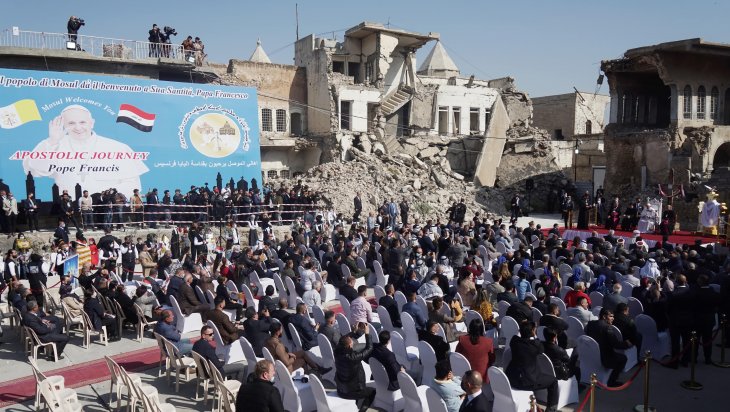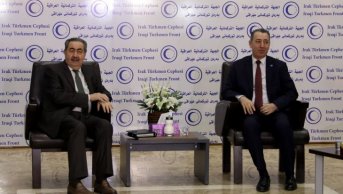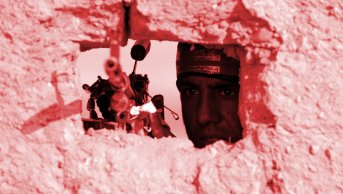The Pope’s Visit to Iraq and Turkmens

The historical visit by Pope Francis to Iraq that started on March 5, 2021 covered five governorates of Iraq, Baghdad, Najaf, Dhi Qar, Mosul and Arbil. Concluded in Arbil on March 7, 2021, its nature and consequences have led to significant discussions in Iraq. It would not be wrong to suggest that the Pope’s visit is considered very important for the social peace in Iraq and was regarded as a positive and significant development by a major portion of the Iraqi people. Kurds and Christians as well as Shiite Arabs welcomed the visit with enthusiasm, while most of the Sunnis view the visit as a positive development that could contribute to the solution of the political and security issues of the country. While the Pope’s visit is critical for the protection of the Iraqi minorities, it also brings along a great potential for ensuring equal political, economic and social rights for other communities. Turkmens also view the Pope’s visit in a positive way in order to safeguard their constitutional and legal rights in Iraq.
For the Iraqi Turkmens, Pope Francis’ visit is important for several reasons. Although not well known, there is a small Christian Turkmen community in Iraq known as ‘Kale Gavurları’ (Citadel Infidels) in Turkmens’ own terms. The state policies and terrorism threat particularly in Kirkuk forced the members of the Iraqi Christian community including the Christian Turkmens to migrate. The Pope’s visit is important for Turkmen Citadel Christians and the Citadel of Kirkuk for two reasons. First, the return of the Christian Turkmens who fled from the former dictatorial regime could be enabled by the restoration of stability and security. Second, the visit might reinforce the claims of the Turkmens for the restoration of the historic sites in the Citadel. The Pope’s visit raised an awareness on the part of the Iraqi people about the ancient city of Ur and the need to protect Iraq’s historic sites as common human heritage. Opening these historic sites for tourism is considered to be a top agenda item by the Iraqi government, which came to the forefront thanks to the Pope’s visit. The importance of Kirkuk in religious, historical and cultural aspects is understood in this context since the tomb of the Prophet Daniel is located in the Citadel of Kirkuk. Therefore, the Pope’s visit has strengthened the calls by Ershad Salehi of the Iraqi Turkmen Front, who is also a member of the Iraqi Parliament, to initiate the restoration of the historic sites in Kirkuk.
The effect of Pope Francis’ visit to Iraq on the calls for establishing social peace has further strengthened the efforts of Turkmens to retain their political and social rights. In this context, the head of the Iraqi Turkmen Front gave his front-line seat at the welcoming ceremony of Pope Francis to a Turkmen woman who was saved from the terrorist group ISIS. Salehi’s action attempted to give a meaningful message to both the Iraqi government and the international community about the need to shed light on the fate of 1,200 people who were kidnapped by ISIS in the Turkmen city of Telafar (Mosul) and the village of Bashir (Kirkuk). While the visit sought to hinder the violence-induced disintegration of the Iraqi society, it also provides an opportunity to bring the sufferings of the Turkmen women rescued from ISIS to the international agenda and demand their rights.
The fate of the contested regions has inevitably come to the top of the agenda when Pope Francis visited Qaraqush, a Christian majority town close to Mosul. For the communities who live in the contested regions where both the Iraqi government and the IKRG vie for administrative and military control, the Papal visit is a significant development for coexistence and social peace. Some political parties started asking for the implementation of Article 140 of the Iraqi constitution, which involves the fate of the contested regions. The visit might also trigger discussions about the statute of the contested settlements in the Nineveh governorate, where Christians, Turkmens and other minorities live such as in Hamdaniya (Qaraqush), Tel Kaif, Bartilla and Bashiqa. Considering the discussions about granting autonomy to these minority settlements that remain in the area called Saheel Neynova (Nineveh Plain), it is highly likely that the Pope’s visit might trigger similar debates once again.
While Turkmens stand as Iraq’s third foundational community, the Iraqi Embassy of the Vatican has not included the Turkish language in the posters related to the visit unlike the Arabic, English, Kurdish and Syriac languages. It demonstrated another aspect in the policy of exclusion against the Turkmens. Despite the fact that the Iraqi Turkmens lived together with Christians throughout history in Kirkuk, Mosul and Arbil, the exclusion of the Turkish language from posters and fliers has been contradictory to the purpose of the visit. In addition to that the only Turkmen Minister Aydın Maruf was not invited to the welcoming ceremony in Arbil. A lasting peace in Iraq is only possible if the rights and representation of all communities are ensured. Otherwise, the current disintegration will only worsen.
While Turkmens believe in and demonstrate their will in accordance with the unity of Iraq, they have inadequate representation in the central government, therefore they were underrepresented in the welcoming and farewell ceremony of the Pope. Since the Presidency is a symbolic post representing the unity of the country, having a Turkmen as Vice President would be important for social representation. Such a step would show that Turkmens are a part of Iraq and traditional policies of marginalization against the Turkmens have ended. Active representation of the Turkmens in government institutions as required will show that Iraq is genuinely a state that embraces all communities and expends effort in this regard. Nevertheless, Iraqi politics is based on the Shiite, Sunni and Kurdish pillars which resulted in the exclusion of Turkmens as well as other minority groups that represent a significant element of Iraq’s history. Iraqi Turkmen politician Ammar Qahya stated that the exclusion of the Turkmens from the welcoming and farewell ceremony of the Pope is contradictory with the Iraqi constitution and human rights. Despite this situation, the Turkmen community looks toward living together in peace and considers the Pope’s visit as an important development for building peace in Iraq. According to the assessment by Ershad Salehi, President of the Iraqi Turkmen Front, the Pope’s visit is critical for mending the situation in Iraq, protecting the communities in the country and ensuring their rights.
In conclusion, Pope Francis’ visit is important for bringing different communities closer and demonstrating that Iraq seeks to leave violence and terrorism in the past. In this context, Prime Minister Mustafa al-Kadhimi’s decision to declare 6 March as National Tolerance and Coexistence Day is very important for ensuring peace and preventing disintegration. At the same time, the exclusion of the Turkish language did not go together with the importance of the visit for the Turkmens. Turkmens received Pope Francis’ visit positively for ensuring peace among all communities in Iraq despite efforts by some groups who wish to attribute the visit to themselves. Furthermore, peace-loving Iraqi Turkmens expect that steps should be taken to ensure the return of Christians who fled from Kirkuk and other contested territories and to reinforce security.









